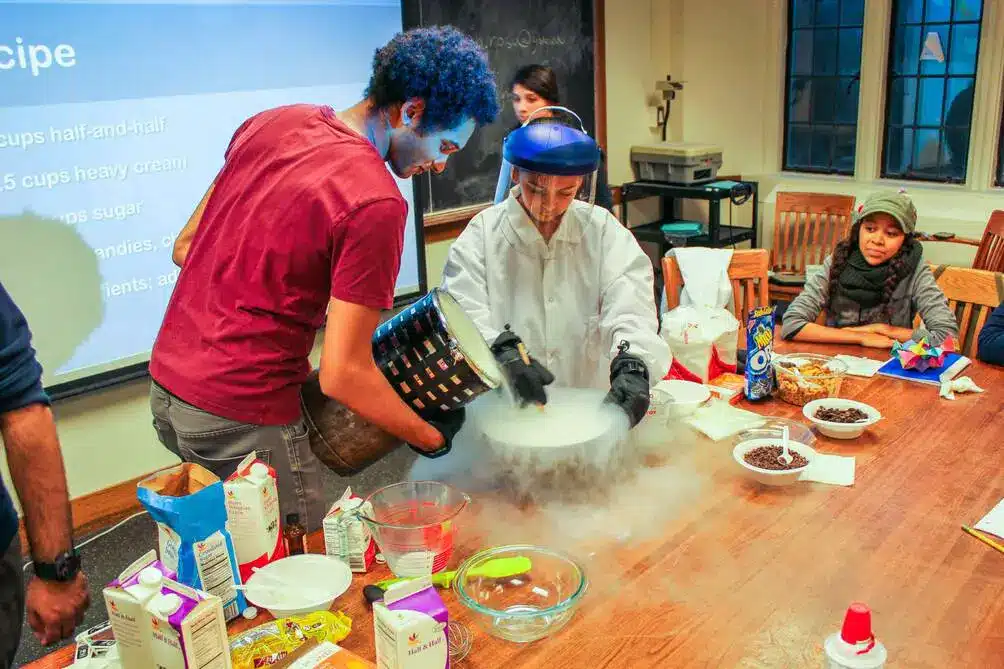I want to tell you about a wonderful program called Splash. It is a weekend learning experience for middle and high school students led by passionate college students at campuses around the country. The program, which started at MIT and has spread to almost 20 colleges, is supported by a vibrant volunteer nonprofit organization called Learning Unlimited (LU), which is primarily funded by Splash alumni and parents.
During a Splash program, hundreds of students gather on campus to learn from college students and community members about a wide array of topics, ranging from STEM to the performing arts and humanities. The classes vary each year based on the interests of the college students who teach them. Each class lasts one or two hours, so participants can choose from a variety of fun, engaging, and thought-provoking subjects throughout the day or weekend. For example, at MIT Splash 2025 students can take Hacking Old Video Games, How Producers Make Hip-Hop and R&B Beats by Sampling and Berry Scientific: DNA Extraction Lab, to name a few. For an idea of all classes offered, check out the course catalogs for Stanford Splash and MIT Splash.

What Teens Gain from Splash Programs
Splash brings together a vibrant community of students who enjoy learning and teaching. My daughter participated in MIT Splash throughout high school, and it was a highlight of her year! Here are some reasons I’ve been a long-time fan of Splash programs.
1. It’s a chance to try something new and explore a topic that just sounds cool. This can be a game-changer for many high school students: I’ve heard parents say that taking a class at Splash introduced their child to an academic field they later chose to pursue in college.
Ben Horowitz, an alumnus of the MIT Splash program, founder of the Yale program, and now executive director at Learning Unlimited, says, “I was so excited to see students who were not that much older than me be so passionate about advanced topics. I’m now an astrophysicist at UC Berkeley, so I guess the passion helped carry through!”
2. It gives teens the chance to meet and learn with other students—both students their own age and college age students.
Niam, an alumnus of the Princeton Splash program, said, “Splash allowed me to interact with the students at the university and listen to what they were learning and were passionate about. It made a big difference in not only deciding what my top colleges were, but also in writing the ‘Why’ essays for those colleges.”
3. The variety and breadth of classes is amazing. The topics in the Yale Splash course catalog particularly delighted one participant:
“When I first heard about Splash, I thought you had to pick normal school subjects, but there are so many options and this is nothing like a regular school day. I love that the kids, not the parents, pick the classes, so kids can really pick what they are interested in. I definitely plan to return and would recommend it to anyone and everyone!”
4. Near-peer mentorship is known to be a game changer. College students who are passionate about a topic and want to teach and introduce younger students to new areas lead fun, inspiring classes in all kinds of disciplines, including STEM and the humanities.
5. Teens get to experience what it’s like to be on a college campus. For some students, this is their first time on a campus and it can help them visualize their future.

When Are Splash Programs Held?
Splash programs generally occur once a year in the fall (typically in November) or the spring (from March to May), although some colleges offer programs twice a year. Each program is independently administered, so the specific schedule is determined by the college students who manage them, based on available resources and college or university policies. Please note: Advanced registration is always required to attend!
How Can I Find Splash Programs?
Many programs are held in the Northeast, but you can also find programs in other regions, such as Stanford Splash and Berkeley Splash on the West Coast and Splash! Chicago and Northwestern Splash in the Midwest. Here’s my four-step recipe for exploring Splash.
- Visit LU’s Current Programs Page for a list of participating universities and colleges, and identify the ones that interest your teen and are geographically accessible.
- Create a Splash account for colleges that interest your teen so you can be notified of future events via email.
- Be sure to read about the registration process for each Splash program, as each college’s program is slightly different, and check out their fees and potential financial aid offerings.
- Follow the Splash programs on social media (many have Instagram accounts); it’s a great way to stay informed about upcoming programs.
What Does Splash Cost?
Many programs are free, and some even include lunch! Others charge a small fee and offer generous financial aid.
Have Questions?
Splash is a terrific learning experience for curious middle and high school students: they get to take classes on diverse and fun topics, get taught by high-energy college students, and spend a day or weekend on a college campus. If this sounds like something your teen would enjoy, follow my four-step recipe, and if you have questions, feel free to reach out to the individual programs as well as to Learning Unlimited at [email protected].
Image Credit: Yale Splash







